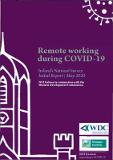Most Irish would like to work remotely after the Covid-19 crisis is over

Just over half of respondents (51%) had never worked from home before the COVID-19 crisis. The majority (87%) of respondents said they had the equipment needed to work from home but poor physical and ergonomic workspace was indicated as one of three key challenges of working from home. The other challenges most frequently cited were not being able to ‘switch off’ from work and greater difficulty in collaborating with colleagues. The remote working experience was however assessed favourably in most respects. 83% of respondents would like to work remotely after the crisis is over (12% on a daily basis, 42% several times a week, 29% several times a month).
Real-time survey sources cited in the recent JRC report on "Teleworkability and the COVID-19 crisis" confirm that for advanced economies the incidence of working from home increased dramatically in reaction to the public health measures taken. The incidence amongst EU Countries varied broadly but largely reflected pre-existing differences, with lower levels of teleworking in Eastern and Southern member states and higher levels in the Nordic and Benelux countries.
